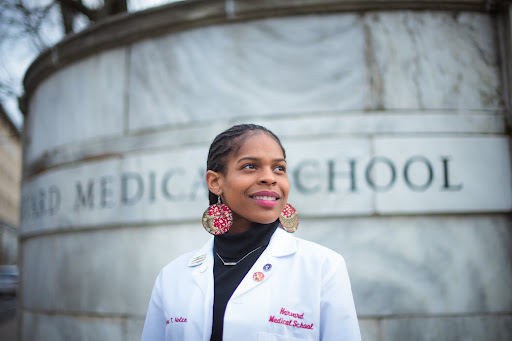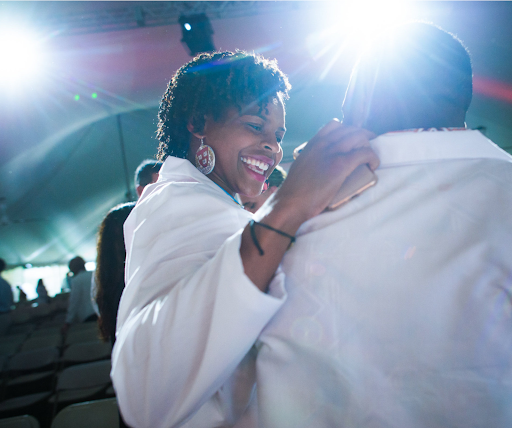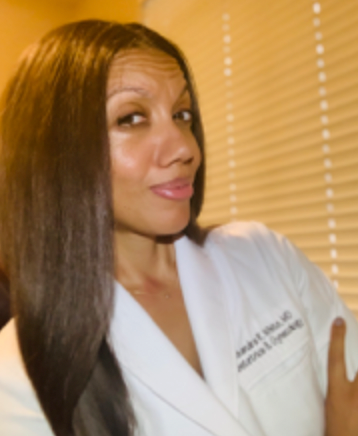

The racial reckoning within the United States medical system is at its most dynamic point in recent history. The enrollment of first-year medical students who identify as black has skyrocketed in the midst of the Covid-19 pandemic. A number of medical institutions have seen a record number of Black students, and the association of American medical colleges reported a national 21 percent increase of Black-identifying students from 2020 to 2021. As positive as this data is, a statistical underbelly looms over the heads of these promising new physicians.
Chronic burnout, feelings of unappreciation, and misplaced medical skepticism threaten the very fidelity of medicine; even The U.S. Bureau of Labor Statistics estimates that the healthcare sector has lost nearly a half-million workers since February 2020. Amid this tumult and despite the positive gains in diversity recruitment, medical education as a whole is struggling in a quicksand of change. In July 2021, the graduate medical education programs at Tulane University were placed on probation for discrimination after a firestorm of public criticism for the suspension of its Black residency program director, Dr. Princess Dennar. Eventually, Tulane requested that Dr. Dennar return, but she refused, citing the conditions were “restrictive and limiting conditions masked as support and resources.”
Sadly, Dr. Dennar’s battle isn’t the only of its kind. The idealism, grit, and drive of Black medical trainees are wedged right in between this landscape, and many of them recognized the uphill battle they have ahead of them. MD candidate and first Black student council president of Harvard Medical School class of 2023, Lashyra “Lash” Nolen, is one such cohort member. “My earliest memory of advocacy was of my grandma. When I was in elementary school, if my grandma ever felt like I wasn’t getting equitable opportunities or even if someone made fun of my shoes, my grandma would fight for me.
She’d be ready to find out why her baby girl wasn’t feeling good that day. And she used that same energy for our community. She’s always been keen, observant, and vocal about inequalities, about why some people had things that others didn’t. In a world that tries to paint Black women as too aggressive, it’s easy to want to shrink yourself and silence yourself to fit that mold, but my grandmother always defied that. She insisted on being authentically herself and speaking up when something was wrong. I try and carry that with me, but it’s not easy. I’m a Black woman from Compton at Harvard medical school.”
For many Black trainees and physicians, existing societal pressures are compounded within the ivory gates of the medical academy. Microaggressions, opaque payment structures, barriers to professional growth, and arbitrary standards of professionalism are just a few of the roadblocks that prevent Black physicians from entering medical environments as their complete selves. For the few Black doctors currently practicing, it is that muting of their abilities that may fray the kinship they have to their communities—affecting the quality of care they give. A 2016 study published in the Journal of Black Psychology mentions,
“The internalization of racial oppression may be the most psychologically damaging result of racism. Once racial oppression has been internalized, it may become self-sustaining such that an individual accepts notions of inferiority regarding one’s group, identifies with the oppressor, and forfeits the ability to define oneself and one’s life experiences. Additionally, African Americans experiencing internalized racial oppression may exhibit oppressive interpersonal behavior toward others who belong or are perceived to belong to their own racial group.
For her part, Lash actively attempts to address that particular influence of medical training on a personal level, “I’ve tried to be intentional about not silencing myself…basically doing what my grandma has taught me to do. Whenever I walk into a space, I try and envision that space as a Black space, a space that I call my own, and I force people around me to adjust accordingly. I spent the early days of my training trying to adjust myself. I thought, let me not do the hoops today or try something different with the clothes I’m wearing. Eventually, I ceased thinking that way and brought 100 percent of myself into those environments.
I put the responsibility on others to move and shift. It was through that practice, that my feelings of doubt and imposter syndrome started to drift away. Ultimately, the more I’m able to bring my authentic self into a particular context, the more I can change the perceptions that my colleagues have about professionalism and about how these settings are supposed to function.”

And how would Lash’s personal change manifest on a clinical plane? She continues, “I want my patients to envision their visits with me as speaking with a beloved member of their community. I want my patients to be excited! Like, “yo, I’m getting my pap smear this week with Dr. Nolen, let’s go!” It’s not just going to be a pap smear. I want to create a safe space where judgments and guards come down, where I get to ask my patients about how they are doing, how their families are doing, and how they are taking care of themselves. I want to create an environment of care that they may not have in other parts of their lives. Particularly for Black women, I want my clinical climate to be one where they feel like they don’t have to carry the burden of the world on their shoulders and be strong. I want my patients to enter as themselves.”
A future where Black patients and physicians can co-create new and healthier potentials is on the horizon. In fact, it’s already here.
Learn more about Lash Nolen’s work:


